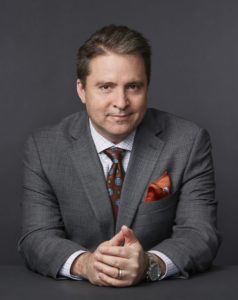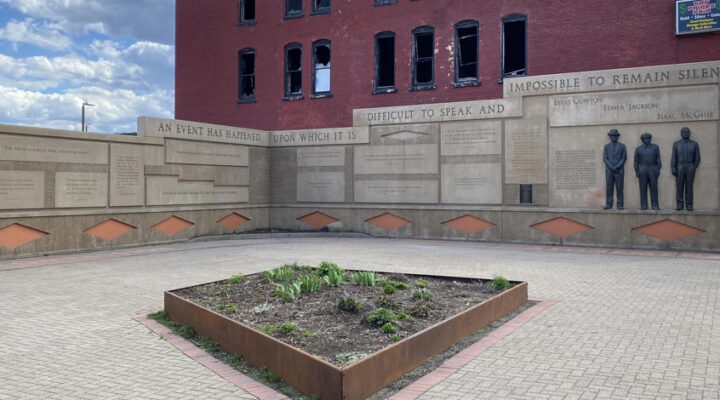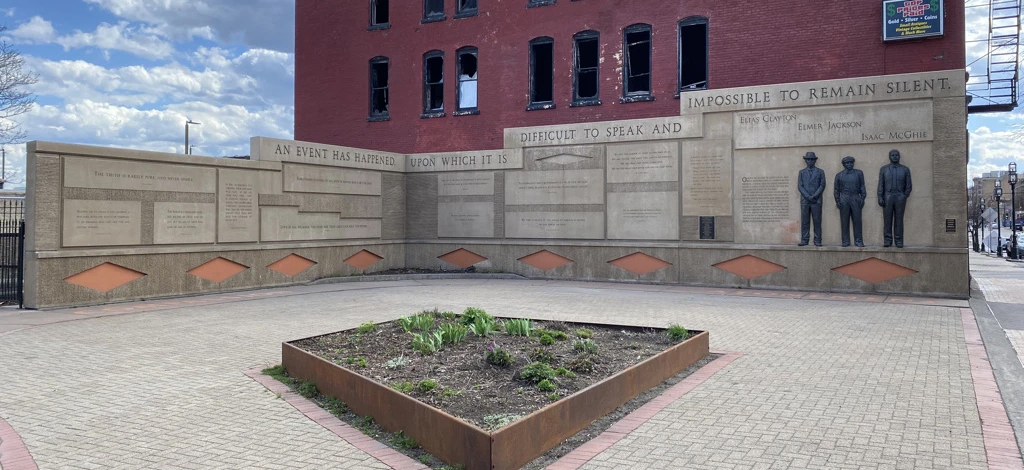I’m still reeling from the experience of standing in George Floyd Square in Minneapolis on the same afternoon a white supremacist terrorist gunned down 10 people in a predominantly Black area of Buffalo, N.Y. I reflected on that experience in last week’s post.
I’ve spent the remainder of the week in Duluth, Minn., talking to a range of community leaders who were involved in creation of the Clayton, Jackson, McGhie Memorial, unveiled in 2003 to memorialize the lives of three Black men who were lynched in 1920. (Photo above.) I’ll have more to say about that in future posts, but here is a picture of this powerful space, a plaza memorializing the victims just across the street from the place where they were murdered while a crowd of between 5,000 and 10,000 looked on approvingly. Note the moving inscription, a quote from Edmund Burke: “An event has happened, upon which it is difficult to speak and impossible to remain silent.”

Robert P. Jones (Photo by Noah Willman)
I read more about the Buffalo shooter’s motivations, especially his fears about “the great replacement,” I wrote a new piece, published at TIME, unpacking how this theory has been intertwined with Christianity. “Replacement,” after all, was the explicit goal of Manifest Destiny doctrine, blessed by Christianity. So, it shouldn’t be surprising that when the U.S. demographics shift from majority to non-majority white and Christian (44% today), violence justified by “replacement” fears erupts.
Below is an excerpt of my new column at TIME.
The massacre in Buffalo has spurred a national discussion about “replacement theory.” The fear of cultural replacement has an unambiguous lineage that gives it specific content. At the center of the “great replacement” logic, there is — and always has been — a desperate desire to preserve some version of Western European Christendom. … If we fail to grasp the power of this ethno-religious appeal, we will misconstrue the nature of, and underestimate the power of, the threat before us. …
Trump’s “Make American Great Again” formula — the stoking of anti-immigrant, anti-Muslim, and anti-Black sentiment while making nativist appeals to the Christian right — contained all the tropes of the old replacement theory. …
Among white Americans, there is high (two-thirds) overlap between beliefs in Christian nationalism and replacement theory. And both views are associated with higher support for political violence among whites:
- White Americans who agree that “God intended America to be a promised land for European Christians” are four times as likely as those who disagree with that statement to believe that “true American patriots may have to resort to violence in order to save our country” (43% vs. 10%).
- White Americans who believe that “immigrants are invading our country and replacing our cultural and ethnic background” are nearly six times as likely as those who disagree with that statement to believe that “true American patriots may have to resort to violence in order to save our country” (45% vs. 8%).
The clear historical record, and contemporary attitudinal data, merit an urgent discussion of white Christian nationalism as a serious and growing threat to our democracy. If we are to understand the danger in which we find ourselves today, we will have to be able to use the words “white Christian nationalism” and “domestic terrorism” in the same sentence.
Robert P. Jones is CEO and founder of PRRI and the author of White Too Long: The Legacy of White Supremacy in American Christianity, which won a 2021 American Book Award.
This column originally appeared on Robert P. Jones’s substack #WhiteTooLong. In partnership with the author and PRRI, each Monday BNG will feature a new column from Jones.
Related articles:
The Great Replacement is a lie and not Christian, Southern Baptist pastor explains
The Beloved Community and the heresy of white replacement: How ‘Beyoncé Mass’ gave me hope after the Buffalo massacre | Opinion by Robert P. Jones
Another racist mass shooting and our failure to tend Jesus’ sheep | Opinion by Emily Holladay


